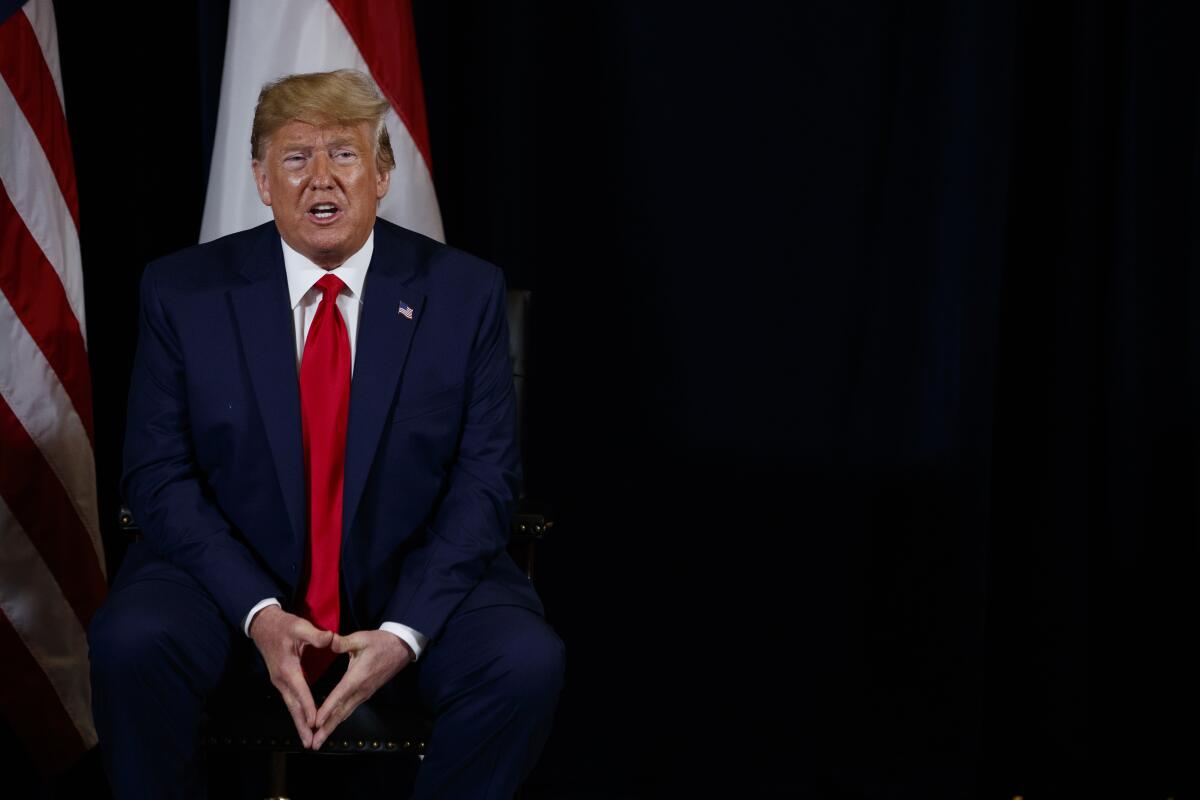Releasing Trump’s Ukraine transcript would easily be the least scary precedent set by this administration

- Share via
House Democrats are expected to decide Tuesday afternoon how to respond to reports that President Trump may have pressured Ukraine’s new president to investigate one of Trump’s political rivals, former Vice President Joe Biden — possibly even by threatening to withhold millions of dollars in military aid. Trump insists he acted appropriately (he actually called his July 25 conversation with Ukrainian President Volodymyr Zelensky “perfect”), and if so, he could suck all the energy out of this political tempest by releasing a transcript of the call.
In fact, he’s said multiple times that he would love to make the transcript public because it would make it clear that the conversation was completely above-board. As he put it Monday during a media availability with Polish President Andrzej Duda, “I hope you get to see the call because ... I did not make a statement that ‘you have do this or I’m not going to give you aid.’ I wouldn’t do that. I wouldn’t do that.”
So why hasn’t he put out the transcript? “I can do it very easily,” Trump said Monday (because of course he can). “But I’d rather not do it from the standpoint of all of the other conversations I have.”
Elaborating later, he denied saying that he wanted to release the transcript. “I don’t think it’s a great precedent to be releasing calls with foreign countries — heads of foreign countries. So I don’t think it’s a great precedent, so I didn’t say I was going to release it at all.”
Mark your calendars, readers. This is the week President Trump cares about setting bad precedents.
It’s a classic Trump maneuver, standing on principle only when it advances his personal interests. His record is replete with norm-shattering precedents, few if any of them welcome. These include refusing to divest his business holdings, keeping his tax returns secret so as to hide potential entanglements and conflicts, lying brazenly and frequently, abrogating treaties, contorting the definitions of national security and states of emergency in order to countermand the will of Congress, simply refusing to enforce duly enacted laws, rules and regulations that his administration doesn’t like — the list goes on and on.
Whoever succeeds Trump will be faced with a Superfund-sized cleanup of the presidency and of the United States’ relationships with the rest of the world. And once congressional Republicans release themselves from the unholy pact they’ve struck with Trump, perhaps lawmakers can start to reclaim the powers they granted the executive branch on the assumption — once seen as reasonable but now revealed as foolish — that the president would use the authority and discretion Congress granted in good faith.
Yes, presidents and foreign leaders shouldn’t have to worry about their private talks going public. But this case isn’t precedent-setting for at least two reasons.
First, only the Trump-Zelensky conversation is at issue, and only because a whistleblower within the U.S. intelligence services raised an issue so serious that the intelligence community’s inspector general rated it a matter of “urgent concern.” And even then, the issue may have gone no further had the administration notified Congress, which it decided not to do because the person implicated — presumably Trump — was not a member of the intelligence community and arguably not covered by the whistleblower statute in question. So the combination of circumstances is rare indeed.
Second, Trump has openly discussed the content of the talks. Not just in the clipped manner of the usual, abbreviated readouts the White House issues in the wake of such talks, but in great detail. The president wants to leave the public with one version of the events: his. He can’t have it both ways.
But oh, he wants to. Here’s yet more from the news conference with Duda. “I put no pressure on them whatsoever,” Trump says of the Ukrainians, but then adds, “I could have. I think it would probably, possibly, have been OK if I did. But I didn’t. I didn’t put any pressure on them whatsoever. You know why? Because they want to do the right thing. And they know about corruption. And they probably know that Joe Biden and his son are corrupt. They probably know that.”
For those readers wondering why I’m ignoring the Joe-Biden-is-corrupt angle, let me quote from conservative columnist Jonah Goldberg’s piece today: “[T]he charge that Biden was freelancing foreign policy to protect his son simply doesn’t hold water if you spend five minutes reading up on it. Biden was acting on orders from President Obama in coordination with allies and State Department policy to force the former Russia-backed Ukrainian regime to fire a dirty prosecutor who was failing to properly investigate corruption, including at the firm Hunter Biden worked with.”
Again, Trump could make this whole thing go away simply by releasing the transcript of the call and letting Congress see the whistleblower’s complaint (which is reportedly based on hearsay). But the president may actually want to keep this pot boiling because it allows him to keep accusing Biden of doing something corrupt that Biden didn’t do. Or maybe he knows that a transcript and the complaint will reveal that his conversation with Zelensky wasn’t so perfect.
Update: The president just announced on Twitter that he has authorized the full transcript to be released Wednesday — adding a new wrinkle to the expected House Democratic caucus meeting late Tuesday afternoon:
More to Read
Updates
11:25 a.m. Sept. 24, 2019: This post was updated with a new tweet from President Trump pledging to release a transcript of his call with the Ukrainian president.
A cure for the common opinion
Get thought-provoking perspectives with our weekly newsletter.
You may occasionally receive promotional content from the Los Angeles Times.










